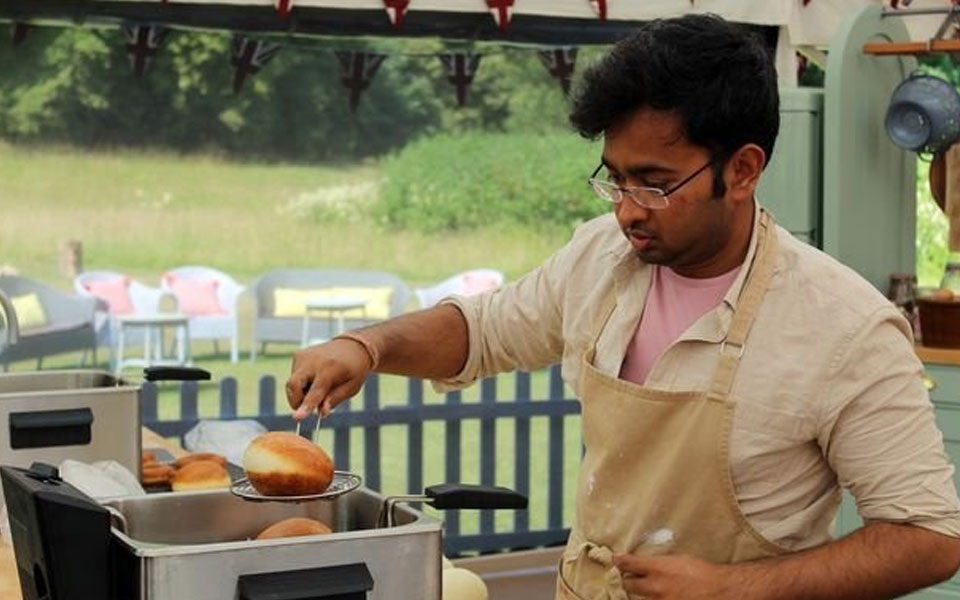London, Oct 31 : An Indian research scientist born in Kolkata has been crowned the winner of a popular baking show on British television after winning over the judges with his intricately-designed cakes and pastries.
Rahul Mandal was announced as the winner of Channel 4's 'Great British Bake Off' on Tuesday night after impressing the judges with his East meets West style of baking.
"I don't know whether to laugh or to cry. I just feel I need to talk with my mum," he said as the winning name was revealed.
The 30-year-old from Rotherham in northern England battled with disasters during the show's finale when his icing bag exploded during a doughnut challenge.
Soon after, his mixing bowl smashed while he was creating his rock garden, inspired by Victorian explorers bringing back exciting plants from around the world, for the "Edible Landscape" show-stopper challenge.
Despite the accidents, the taste and complexity of Mandal's baking saw him win over the judges as he beat fellow British Indian contestant Ruby Bhogal and Kim-Joy Hewlett in the grand finale of the long-running TV show.
"He is one of those characters that you will miss when you are not with him. I don't think he realises still how good he actually is and I think that's what's magic about Rahul," said celebrity chef Paul Hollywood, one of the judges.
Mandal, who grew up in Kolkata, started cooking and baking as a hobby only after he moved to the UK as a student.
"I never baked when I was in India. My baking journey began in the UK about five years ago when I was feeling lonely, and needed to do something along with my studies," he said.
"At that time, it was limited to making bread and biscuits. The first cake I made was about two years ago, when my parents visited the UK for the first time," he added.
Each year, amateur baking enthusiasts compete to get a spot among 12 bake-off contestants and spend nine weeks in a large tent to compete in a series of elimination rounds.
The winner is presented with a coveted cake stand trophy and the publicity from the show can result in a huge career boost for many of the contestants.
"Cooking programmes always interested me. Even as a child, rather than watching sports, I enjoyed watching cookery shows. I started cooking and experimenting with food from the age of 15, however, proper everyday cooking started since I moved to UK," Mandal said.
"I like the simple classics, sometimes with a little twist in it. My colleagues love my Lemon drizzle cake and its cousins like Lemon and cardamom drizzle cake, or lemon and elderflower drizzle cake -- they like them a lot," he said.
While baking is hobby, he sees a connect with his day job as a scientist as he believes meticulous planning and attention to detail come in handy for both.
"If it is something big, I develop and design it over the week and then execute it over the weekend," he said.
The final three contestants in the 2018 series were evenly matched for this year's finale, which attracted a lot of social media attention.
Fans were divided over Mandal being given an additional 15 minutes after he smashed his mixing bowl while creating his showstopper but the majority were rooting for the shy and humble scientist-baker.
The latest series proved a ratings success for Channel 4, which took over the show last year following its move from its original home on the BBC.
Let the Truth be known. If you read VB and like VB, please be a VB Supporter and Help us deliver the Truth to one and all.
Hyderabad (PTI): Telangana Chief Minister A Revanth Reddy met Union Home Minister Amit Shah in Delhi on Wednesday night and urged him to increase the sanctioned strength of IPS officers to the state in view of its growing administrative and security needs.
The two leaders also discussed the recent surrender of several senior Maoist leaders before the Telangana Police and other issues.
"During the meeting, the two leaders discussed the issue of Maoist surrenders and their rehabilitation. The chief minister informed Shah that significant improvements in policing have taken place in Telangana over the past two years," an official release here said.
Highlighting that 591 Maoists have laid down their arms and joined the mainstream of society during this period, the chief minister said the state government was providing them compensation and rehabilitation assistance as per the rules.
He requested the Union home minister to extend financial support from the central government for development works in the backward regions of the state.
Reddy also urged Shah to increase the sanctioned strength of IPS officers to the state from 83 to 105 in line with the state's growing administrative and security needs, the statement said.
The first cadre review after the formation of Telangana was conducted in 2016, while the next review, due in 2021, was delayed and finally carried out in 2025. Even then, only seven additional IPS officers were allocated to the state, the chief minister informed Shah and requested that the third cadre review be conducted in 2026 as per the schedule.
Reddy explained that Telangana, like the rest of the country, is facing several modern challenges, including cybercrime, drug trafficking, white-collar crimes, and other emerging security threats.
He highlighted the reorganisation of the Hyderabad, Cyberabad, and Malkajgiri Police Commissionerates, the proposed formation of the Future City Commissionerate and the rapidly growing population in Hyderabad to underline the increasing administrative requirements of the state.





